Mysuru: There are some old and time-tested sayings like ‘Crime never pays’, ‘Every criminal leaves a clue’ and ‘There is no perfect crime’. What made wise men to come up with such sayings is, of course, Forensic Science and its various branches which help Policemen to crack criminal cases.
Crime, its various forms and the way clever investigators detect them is always a subject of interest. In an attempt to bring criminal acts closer to people to create awareness, the Department of Forensic Medicine, JSS Medical College, has organised a two-day ‘Forensic Fair’ at its campus. The exhibition that began yesterday at the college campus in Bannimantap, will conclude this evening.
Some of the aspects of Forensics that are dealt at the exhibition are DNA finger printing, comparison of cartridges, dental evidence, trauma, analytical procedures to detect poisons, types of signatures and the way to decipher them, difference between a person hanging himself to death or a hanging that takes place after the person is murdered, importance of blood samples in murders, sexual assault, food adulteration and cybercrime.
The Karnataka Police Academy (KPA) had recreated the types of unnatural deaths with the help of Plaster of Paris (PoP) models that included murder, suicide and also burns.
The Department of Criminology and Forensic Sciences, Maharaja’s College, had set up a stall at the exhibition that told about human bones. Darshan of the college explained, “Generally we identify the bones by its look and strength. If a bone is bright and strong, it is of a male and if it is dark and a bit weak, it is female. Bones do not lose its colour even after many years. Even if it is burnt, we can identify the bones with latest technologies.”
GUNS STEAL THE SHOW
The main attraction at the exhibition is, however, the section where guns are kept. The stall has been set up by KPA and Head Constable Kumar explains the guns and its features. There are guns like the dreaded and advanced AK-47 that were earlier used by militants to strike terror in Punjab and Jammu-Kashmir.
The AK-47 or AK, as it is officially known — Avtomat Kalashnikova or ‘Kalashnikov’s Automatic Rifle, also known as the Kalashnikov, is a gas-operated 7.62×39mm assault rifle, developed in the Soviet Union by Mikhail Kalashnikov. It is the originating firearm of the Kalashnikov rifle (or ‘AK’) family.
AK-47 and its variants remain the most popular and widely used assault rifles in the world because of their substantial reliability under harsh conditions, low production costs compared to contemporary Western weapons, availability in virtually every geographic region and ease of use. It can fire 30 rounds and its effective range is 600 yards with a killing range of 300 yards.
Next is the Single Barrel Gun or the 7.60 mm Self-Loading Rifle (SLR). It is an automatic rifle, a firearm that automatically loads and fires rounds, through the bullet’s energy, as long as its trigger is held down. It was initially used by the Commonwealth of Nations from the 1950s to the 1980s. The rifle can fire 20 rounds.
Apart from AK-47 and SLRs, double-barrel gun, tear-gas guns and the primitive .303 rifle are on display. The .303 is a bolt-action, magazine-fed, repeating rifle that was the main firearm used by the military forces of the British Empire.
Indian Police force still uses this rifle, especially for training, though a major part of the force has automatic weapons to deal with growing terrorism. It is called the Rifle because of their rifling action of the bullet as it passes the spiral groove in the barrel. The .303 has an effective range of 600 yards with a killing range of 300 yards.
Next is the 9mm automatic pistol with a killing range of 50 yards and an effective range of 200 yards. It can fire 13 rounds. And the next time when you see your film hero firing more than 13 times at the villain from the pistol, you know it is fake as the weapon can fire only 13 rounds.
This pistol is a semi-automatic one currently manufactured by Rifle Factory Ishapore in West Bengal. A licensed copy of the Browning Hi-Power, the weapon, as per the Arms Act of India 1959, comes under the “Prohibited Bore” category and possession by civilians is illegal.
TRAFFIC AWARENESS
The Narasimharaja Police have set up a special counter for traffic awareness at the exhibition. A team of Policemen comprising Assistant Sub-Inspector Nanjunda Swamy and Head Constable Narayana Swamy, explains the hazards of traffic violations and how they contribute to the loss of life and limb.
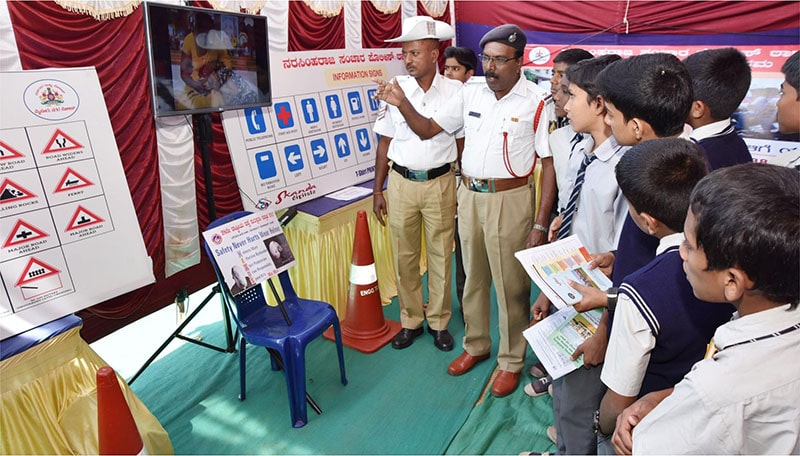
Narasimharaja Police Assistant Sub-Inspector Nanjunda
Swamy and Head Constable Narayana Swamy seen explaining
the hazards of traffic violations to students.
With a special TV screen with movies and videos, visitors are told to wear good-quality helmets, the dangers of high-beam light, dangerous usage of mobile phones while driving, and the bad effects of signal jumping.
“Two-wheeler riders generally wear duplicate helmets just to avoid Traffic Police. They do not realise that the helmet rule has been enforced for their own safety,” said Nanjunda Swamy.
Famous cases that rocked India
There is a separate section on the famous crime cases that rocked India and where Forensic Science has played a key role. They include the killing of forest brigand Veerappan, Sheena Bora Murder case, Aarushi Murder case, Nithari killings and the Tandoor murder case. These cases are explained through forensic angle where the investigators tried their best to gather evidence through scientific methods.
The exhibition throws light on suicide by hanging and explains the difference between a suicide and what is made to look like a suicide. “By looking at the hanging dead body, an investigator can identify if it is a suicide or a murder. Suicide by hanging has certain traits and all these traits are missing when a person is killed and hung. The investigator’s theory is always proven by post-mortem report,” said Manjunatha from KPA.
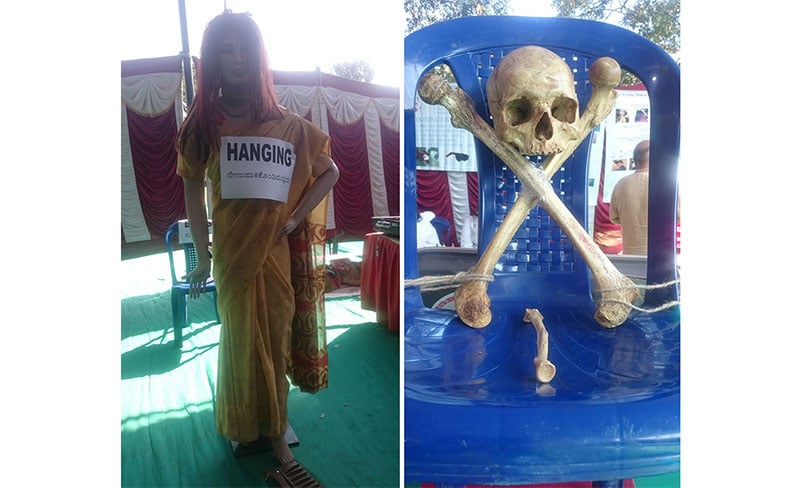
model displayed at the Forensic Fair explains death by
hanging or when a murder case is made to look like a suicide.
Picture right shows human bones on display at the expo.
Bones of a male are a bit brighter than that of a female.
The expo has been organised to create awareness about crime and its investigation. “We have organised this as part of our community outreach programme,” said Dr. H.V. Chandrakanth, Professor and Head, Dept. of Forensic Medicine, JSS Medical College.
GUNS ON DISPLAY
Avtomat Kalashnikova or AK-47: 7.62x39mm assault rifle, developed in the Soviet Union. It can fire 30 rounds and its effective range is 600 yards with a killing range of 300 yards.
Single Barrel Gun or Self-Loading Rifle: It can fire 20 rounds and has a killing range of 300 yards.
.303 Rifle: A bolt-action, magazine-fed, repeating rifle. It has an effective range of 600 yards with a killing range of 300 yards.
9mm automatic pistol: Has a killing range of 50 yards and an effective range of 200 yards. It can fire 13 rounds.



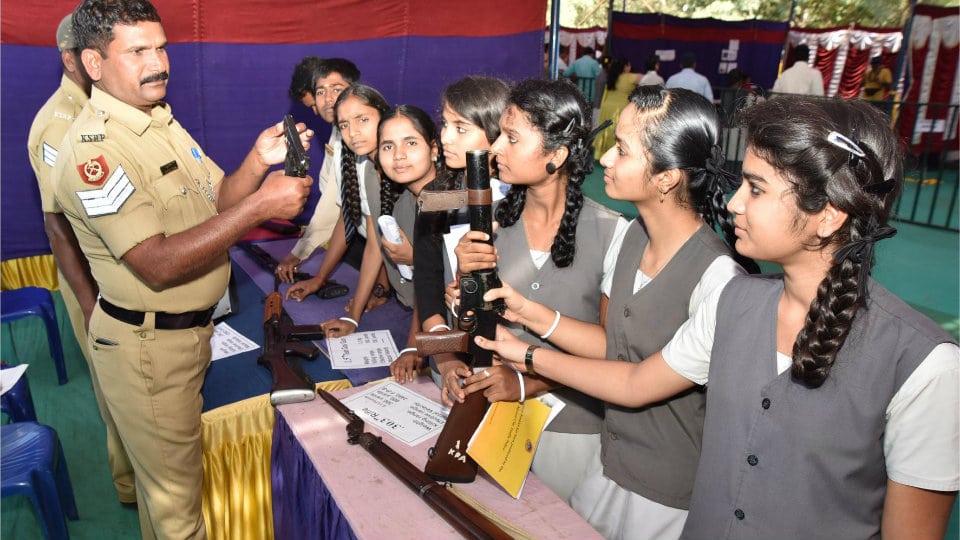
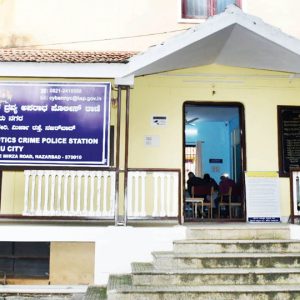
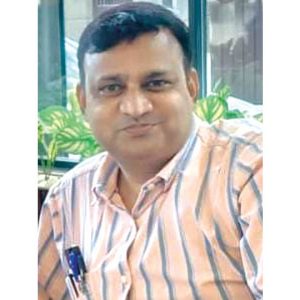

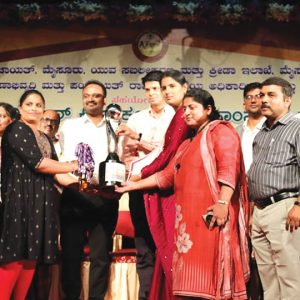
Recent Comments